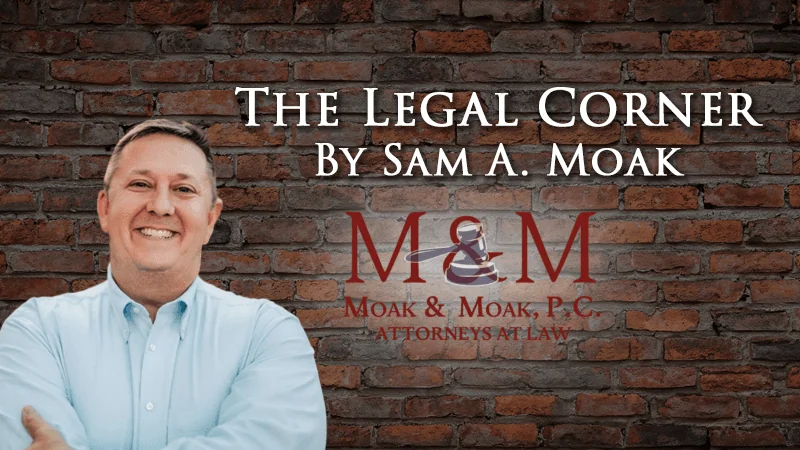The information in this column is not intended as legal advice but to provide a general understanding of the law. Any readers with a legal problem, including those whose questions are addressed here, should consult an attorney for advice on their particular circumstances.
We plan our vacations, can spend hours choosing a car to buy, and can even spend time selecting a spot to eat dinner. If you are a business owner, you spend time budgeting and buying office equipment. Rancher spend time preparing feeding, working their cattle, and vacinating them. However, we all seem to push estate planning—deciding who we want in charge in the event of an emergency or who will inherit their assets after we are gone. It may not be as fun to think about as booking a trip or checking out restaurant reviews, but without estate planning, you can’t choose who who makes medical decisions for you or who gets everything that you worked so hard for.
Estate planning applies to everyone and you don’t have to be rich. Without a plan in place, settling your affairs after you go could have a long-lasting—and costly—impact on your loved ones, even if you don’t have a pricey home, large IRA, or valuable art to pass on. Not convinced that an estate plan is necessary. Let me give you four reasons why you should have one and avoid potentially devastating consequences for your heirs.
1) If you want to choose who will inherit what among your possessions and valuables, you need do some estate planning.
2) Estate planning allows you the ability to name your children’s guardian in the event of your premature death.
3) Reducing taxes on what you leave behind is a common estate-planning goal.
4) Estate planning minimizes the chances of family strife and ugly legal battles.
An Estate Plan Protects Beneficiaries
If estate planning was once considered something that only high net worth individuals needed, that’s changed. Nowadays many middle-class families need to plan for when something happens to a family’s breadwinner (or breadwinners). After all, you don’t have to be super-rich to do well in the stock market or real estate, both of which produce assets that you’ll want to pass on to your heirs.
Even if you’re only leaving behind a home, if you don’t decide who receives the property when you pass away you won’t have any control over what happens to it.
That’s because the main component of estate planning is designating heirs for your assets, whether it’s a summer house or a stock portfolio. Without an estate plan, Texas law will decide who gets your assets, a process that can take years, rack up fees, and get ugly. After all, a court doesn’t know which sibling has been responsible and which one shouldn’t have free access to cash. Nor will the courts automatically rule that the surviving spouse gets everything.
If you die without a Last Will and Testament, which is a vital part of an estate plan, Texas law will decide who gets your assets.
An Estate Plan Protects Young Children
Nobody thinks of dying young, but if you’re the parent of small children, you need to prepare for the unthinkable. This is where the will portion of an estate plan comes in.
To ensure that your children are cared for in a manner of which you approve, you’ll want to name their guardians in the event that both parents die before the kids turn 18. Without a Last Will and Testament that names these guardians, the courts will step in to decide who will raise your children.
An Estate Plan Can Spare Heirs a Big Tax Bite
Estate planning is all about protecting your loved ones, which means in part giving them protection from the Internal Revenue Service (IRS). Essential to estate planning is transferring assets to heirs with an eye toward creating the smallest possible tax burden for them.
While the current estate tax is only applicable to couples with assets exceeding $26,000,000.00, it is a consideration for some. Even just a bit of estate planning can enable couples to reduce much or even all of their federal estate taxes and be aware of potential capital gains taxes. There are also ways to decrease the income tax beneficiaries might have to pay. Without a plan, the amount that your heirs will owe Uncle Sam could be quite a lot.
An Estate Plan Can Help Eliminate Family Messes
We’ve all heard the horror stories. Someone with money dies and the war between family members begins. One sibling may think they deserve more than another, or one sibling may think they should be in charge of the finances even though they're notorious for racking up debt. Such squabbling can get ugly and end up in court, with family members pitted against one another.
Stopping fights before they start is yet another reason why an estate plan is necessary. This will enable you to choose who controls your finances and assets if you become mentally incapacitated or after you die and will go a long way toward quelling any family strife and ensuring that your assets are handled in the way that you intended.
It also will help you make individualized plans, if necessary—to arrange for a child with health problems or to set up a trust for one who might be better off not inheriting a lump sum. It can also help you give more to the child who did most of the work of caring for you in your later years or less to the one whose extensive education you funded while paying far less for their siblings.
Deciding whether to divide your estate exactly equally is one of the key tasks you need to think through. And, of course, if you've had more than one spouse—or have children from more than one family—an estate plan is urgent.
If you want your assets and your loved ones protected when you can no longer do it, you will need an estate plan. Without one your heirs could face big expenses and Texas law could designate how your assets are divided—and even who gets to raise your children.
Sam A. Moak is an attorney with the Huntsville law firm of Moak & Moak, P.C. He is licensed to practice in all fields of law by the Supreme Court of Texas, is a Member of the State Bar College, and is a member of the Real Estate, Probate and Trust Law Section of the State Bar of Texas. www.moakandmoak.com

